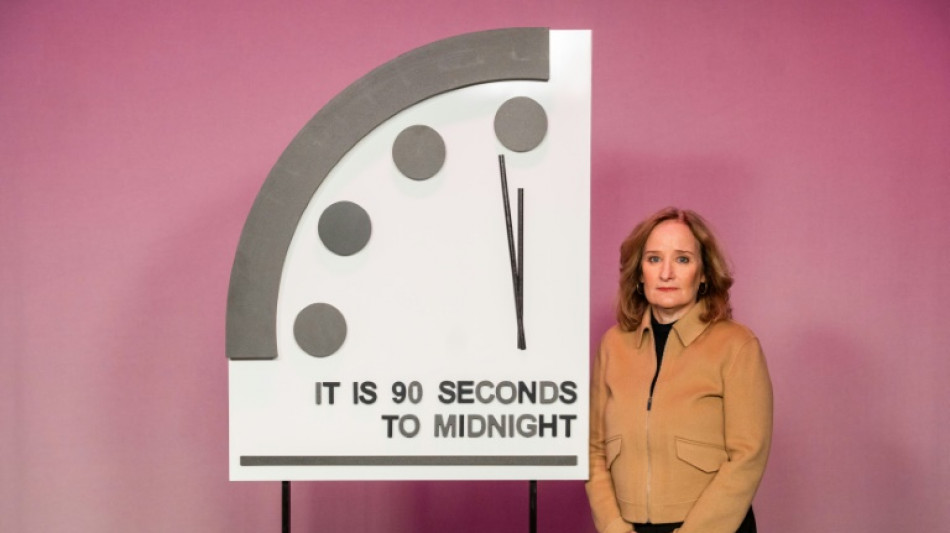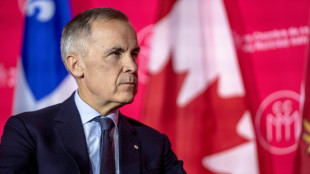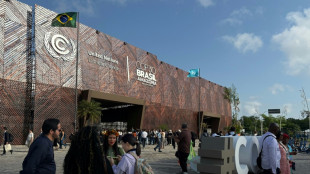
-
 Carney's Liberals pass budget, avoiding snap Canada election
Carney's Liberals pass budget, avoiding snap Canada election
-
LeBron back in training, edges closer to Lakers return

-
 Climate talks run into night as COP30 hosts seek breakthrough
Climate talks run into night as COP30 hosts seek breakthrough
-
Germany and Netherlands lock up World Cup spots in style

-
 Germany's Woltemade hopes for 2026 World Cup spot after scoring again
Germany's Woltemade hopes for 2026 World Cup spot after scoring again
-
Germany 'send message' with Slovakia rout to reach 2026 World Cup

-
 Trump unveils fast-track visas for World Cup ticket holders
Trump unveils fast-track visas for World Cup ticket holders
-
Netherlands qualify for World Cup, Poland in play-offs

-
 Germany crush Slovakia to qualify for 2026 World Cup
Germany crush Slovakia to qualify for 2026 World Cup
-
Stocks gloomy on earnings and tech jitters, US rate worries

-
 'In it to win it': Australia doubles down on climate hosting bid
'In it to win it': Australia doubles down on climate hosting bid
-
Former NFL star Brown could face 30 yrs jail for shooting case: prosecutor

-
 Fate of Canada government hinges on tight budget vote
Fate of Canada government hinges on tight budget vote
-
New research measures how much plastic is lethal for marine life

-
 Mbappe, PSG face off in multi-million lawsuit
Mbappe, PSG face off in multi-million lawsuit
-
EU defends carbon tax as ministers take over COP30 negotiations

-
 McCartney to release silent AI protest song
McCartney to release silent AI protest song
-
Stocks tepid on uncertainty over earnings, tech rally, US rates

-
 Louvre shuts gallery over ceiling safety fears
Louvre shuts gallery over ceiling safety fears
-
'Stranded, stressed' giraffes in Kenya relocated as habitats encroached

-
 US Supreme Court to hear migrant asylum claim case
US Supreme Court to hear migrant asylum claim case
-
Western aid cuts could cause 22.6 million deaths, researchers say

-
 Clarke hails Scotland 'legends' ahead of crunch World Cup qualifier
Clarke hails Scotland 'legends' ahead of crunch World Cup qualifier
-
S.Africa says 'suspicious' flights from Israel show 'agenda to cleanse Palestinians'

-
 South Korea pledges to phase out coal plants at COP30
South Korea pledges to phase out coal plants at COP30
-
Ex-PSG footballer Hamraoui claims 3.5m euros damages against club

-
 Mbappe, PSG in counterclaims worth hundreds of millions
Mbappe, PSG in counterclaims worth hundreds of millions
-
Two newly discovered Bach organ works unveiled in Germany

-
 Stocks lower on uncertainty over earnings, tech rally, US rates
Stocks lower on uncertainty over earnings, tech rally, US rates
-
Barca to make long-awaited Camp Nou return on November 22

-
 COP30 talks enter homestretch with UN warning against 'stonewalling'
COP30 talks enter homestretch with UN warning against 'stonewalling'
-
France makes 'historic' accord to sell Ukraine 100 warplanes

-
 Delhi car bombing accused appears in Indian court, another suspect held
Delhi car bombing accused appears in Indian court, another suspect held
-
Emirates orders 65 more Boeing 777X planes despite delays

-
 Ex-champion Joshua to fight YouTube star Jake Paul
Ex-champion Joshua to fight YouTube star Jake Paul
-
Bangladesh court sentences ex-PM to be hanged for crimes against humanity

-
 Trade tensions force EU to cut 2026 eurozone growth forecast
Trade tensions force EU to cut 2026 eurozone growth forecast
-
'Killed without knowing why': Sudanese exiles relive Darfur's past

-
 Stocks lower on uncertainty over tech rally, US rates
Stocks lower on uncertainty over tech rally, US rates
-
Death toll from Indonesia landslides rises to 18

-
 Macron, Zelensky sign accord for Ukraine to buy French fighter jets
Macron, Zelensky sign accord for Ukraine to buy French fighter jets
-
India Delhi car bomb accused appears in court

-
 Bangladesh ex-PM sentenced to be hanged for crimes against humanity
Bangladesh ex-PM sentenced to be hanged for crimes against humanity
-
Leftist, far-right candidates advance to Chilean presidential run-off

-
 Bangladesh's Hasina: from PM to crimes against humanity convict
Bangladesh's Hasina: from PM to crimes against humanity convict
-
Rugby chiefs unveil 'watershed' Nations Championship

-
 EU predicts less eurozone 2026 growth due to trade tensions
EU predicts less eurozone 2026 growth due to trade tensions
-
Swiss growth suffered from US tariffs in Q3: data

-
 Bangladesh ex-PM sentenced to death for crimes against humanity
Bangladesh ex-PM sentenced to death for crimes against humanity
-
Singapore jails 'attention seeking' Australian over Ariana Grande incident


'Doomsday Clock' remains at 90 seconds to midnight
The symbolic "Doomsday Clock" was held at 90 seconds to midnight Tuesday, reflecting existential threats to humanity posed by potential nuclear escalation from the war in Ukraine and the multiplying impacts of the climate crisis following Earth's hottest recorded year.
Set by top scientists and security experts, the timing of the clock remains the same as last year and the closest it has ever been to midnight in its more than 75-year-history.
"Trends continue to point ominously towards global catastrophe," said Rachel Bronson, president and CEO of the Bulletin of Atomic Scientists. "The war in Ukraine poses an ever present risk of nuclear escalation, and the October 7 attack in Israel and war in Gaza provides further illustration of the horrors of modern war, even without nuclear escalation."
Rather than abandoning nuclear weapons, countries that possess them are upgrading their arsenals, while massive floods, fires and other climate disasters threatened billions of lives and livelihoods in a year that saw record-shattering temperatures caused by mankind's reluctance to turn away from fossil fuels.
"Biological research aimed at preventing future pandemics has proven useful, but also presents the risks of causing one," Bronson said, while recent advances in artificial intelligence (AI) raise questions about how to control a technology "that could improve or threaten civilization in countless ways."
-War in Ukraine looms large -
Russia's invasion of Ukraine, now just a month away from its second anniversary, was the principal reason behind the clock being moved to 90 seconds before midnight in 2023, and continued to overshadow this year's update.
Moscow's thinly veiled threats of nuclear war, its attacks on nuclear sites, and its erosion of international norms of conduct have all contributed to heightened risk, the Bulletin said, while Israel's war in Gaza threatens to evolve into a wider regional conflict involving nuclear states.
Meanwhile, "traditional nuclear arms control really has come to an end for now," said Alex Glaser, a Princeton University professor of mechanical and aerospace engineering. Russia withdrew from the New Strategic Arms Reduction Treaty (New START) and the Comprehensive Nuclear-Test-Ban Treaty (CTBT), which the United States never ratified to begin with.
China is increasing its arsenal, which now stands at 500 nuclear weapons, "and for the first time, at least in my adult life, there is now talk in Washington that the US nuclear arsenal will have to increase also in order to match... Russia and China combined," Glaser added.
On climate, Ambuj Sagar, a professor at the Indian Institute of Technology Delhi said there had been a "mixed story," hailing $1.7 trillion invested in clean energy at the climate COP in Dubai as a sign of moving in the right direction, albeit "not as fast or as deeply" as required.
The clock was originally set at seven minutes to midnight in 1947.
The furthest from midnight it has ever been is 17 minutes, following the end of the Cold War in 1991.
The Bulletin was founded in 1945 by Albert Einstein, J. Robert Oppenheimer and other scientists who worked on the Manhattan Project, which produced the first nuclear weapons. The idea of the clock symbolizing global vulnerability to catastrophe followed two years later.
G.AbuHamad--SF-PST




